Welcome to the ninth installment of More Than Words, where I take queer words of all sorts and smash them apart and see what makes them tick. Every week I’ll be dissecting a different word, trying to figure out where it came from, how it has evolved, where it might be going, and what it all means. It’s like reading the dictionary through a prism. Feel free to send word suggestions to cara@autostraddle.com.
Header by Rory Midhani
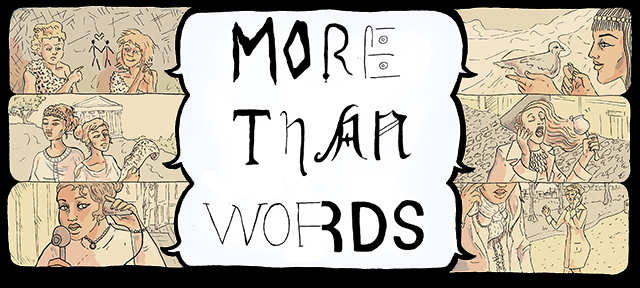
One of the dangers of publishing a newspaper called Intolerancia: you might get sued for intolerancia. Enrique Núñez Quiroz, who holds that job, found this out the hard way after he published an editorial in 2009 calling Prida Huerta, the publisher of rival Puebla paper Sintesis, puñal and all of Huerta’s writers maricones. In 2010, Huerta sued Quiroz for moral damage” (the Mexican equivalent of defamation); Huerta won and Quiroz appealed, enough times that the case made it all the way to the Mexican Supreme Court. Earlier this month, after deliberating hard and long over “the complex conflict between freedom of expression and discriminatory demonstrations — a first for Mexican jurisprudence,” the First Chamber of the Court ruled 3-2 in favor of Huerta, finding that since these words are homophobic, they don’t count as protected speech. What are these words? What’s going to happen to them now? Where did they come from, and what more do they mean now that they’ve been set apart?
The word maricón might ring a bell. I don’t speak Spanish at all and yet it still sets off alarms for me. University of Colorado linguist Sara Balder translates it approximately as “big Mary” and casts it as “by far the most frequently used heterosexist address term” in Spanish-speaking countries. Like most slang, it means different things depending on where it’s said and who’s saying it. In Mexico, it can be roughly pinpointed at the intersection between “gay person,” “bad person,” and “coward.” Like much slang, its potential to wound or incite falls on a wide spectrum — it’s bandied about jokingly (of course, not at all harmlessly) on school playgrounds, “that’s-so-gay”-style, but it’s also the slur that drove closeted boxer Emile Griffith to beat his taunter and opponent Benny Paret to death in 1962. It was supposedly Fidel Castro’s ultimate insult: legend has it he sent Gabriel García Márquez to leaders in Panama and Spain with the short message “Dice Fidel que usted es un maricón” (“Fidel says you are a maricón” — the ugliest sentence Márquez was ever involved with, I’d guess).

It’s a thoroughly modern slur in that it’s even caused famous people to give emergency press conferences: namely former Democratic presidential hopeful Bill Richardson, who drew flack for saying it on Don Imus’s show in 2007, and Toronto Blue Jay shortstop Yunel Escobar, who was suspended for three games last fall after he wrote it on his eyeblack. Both later “apologized” by saying that they considered the word to simply mean “effeminate,” not bad-and-gay (because, you know, that’s not problematic! As Jay Michaelson of the Daily Beast says, “Maybe maricón’s real target isn’t gays, but women”). Puñal means “dagger,” and is slang for, roughly, a deceitful gay man.
But now, if a newspaper in Mexico calls you either of these things you can sue and you’ll probably win. Although this ruling will not inspire any hard and fast laws — because of how the Mexican judicial system is set up, the same issue has to arise several times, in several states, before a binding precedent is set — it will, at least, set the tone for future cases. And there may be a lot of those; Two attorneys predicted “a cascade” of similar lawsuits now that the ruling has hit the books.
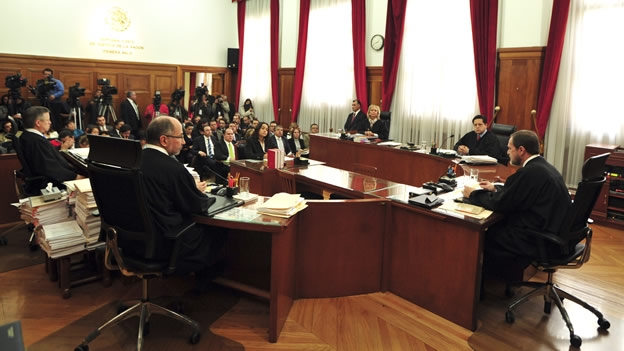
Others hope that their decision will have further-reaching effects. According to the Associated Press, “the resolution was praised by the Mexican gay and lesbian community and anti-discrimination activists as a step forward in the fight for equality in this conservative country rife with machismo.” Alejandro Brito, the head of a gay rights group called Letter S, thinks it will have a positive effect on the media, and CONAPRED (Conseja Nacional para Prevenir la Discriminacion, or the National Council to Prevent Discrimination) thinks it will set, at the very least, a social precedent, and “clarify the public discussion of the validity of sending messages based on hate speech.” Fernando del Collado, a journalist and homophobia expert, was pleasantly surprised by the ruling, but says that detailed and far-reaching legislation will be required to actually combat a discriminatory tradition that, as in most countries, appears everywhere from “football stadiums to church pulpits and political discourse.” Critics in the opposite direction call the decision “ridiculous” and say it sets up a slippery slope of censorship that will lead to a long blacklist of words.
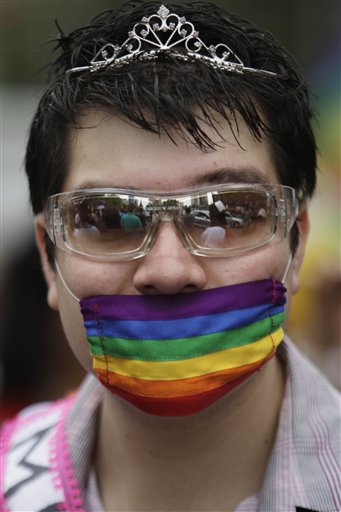
I’m a U.S. citizen, which makes me incredibly skeptical of any limitations on freedom of speech. But it also makes me crush pretty hard on government entities (especially judicial branches, especially right now) that appear to prioritize speeding along social progress rather than riding its coattails and dragging their gavels. I was very interested to see what the justices themselves hoped to accomplish with their decision. In a press release (translated in full by Andrés Duque at Blabbeando), the Chamber explained its reasoning, and in doing so revealed a decision-making process that seems inspiringly proactive. After acknowledging “the strong influence language has on people’s perception of reality,” and how that influence can lead to prejudice when the language used “takes for granted the marginalization of certain individuals or groups,” the court went on to state that:
“Homophobic expressions – in other words, the frequent allegations that homosexuality is not a valid option but an inferior condition – constitute discriminatory statements even if they are expressed jokingly, since they can be used to encourage, promote, and justify intolerance against gays [. . .] the words “maricones” and “puñal” . . . are expressions which are certainly deeply rooted in the language of Mexican society, but the truth is that the practices of a majority of participants in a society cannot trump violations of basic rights.”
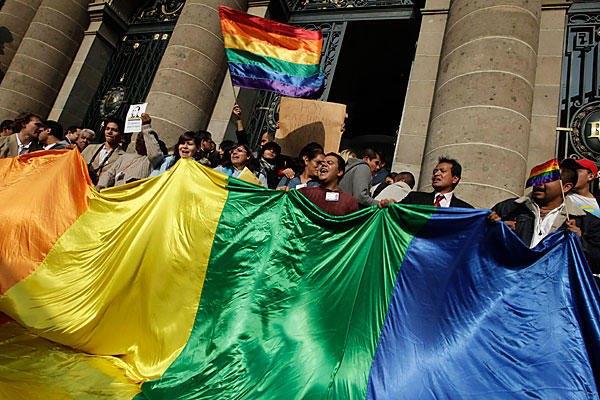
In an editorial for the New York Times last year, Stanley Fish writes about two different governmental responses to hate speech. In the first, as practiced in Canada, “hate speech is a virus” that “produces enduring injuries to self-worth and undermines social cohesion.” It must be squashed at all costs. In the second, the modus operandi of the United States, “hate speech is an opportunity” to allow the ills of society to air themselves out, so that we can address the causes of the problem rather than band-aiding the symptoms. Those affected by the speech are seen not as victims but as “resolute individuals . . . made stronger by the encounter.”
Both of these methods have clear flaws. One seems to suggest that silencing ideas will make them go away. The other means that the Westboro Baptist Church can continue to picket military funerals. In this light, the Mexican Supreme Court’s method of dealing with hate speech — acknowledging the ill affects it can have on individuals and society, diagnosing certain words as intrinsically hateful in whatever context, and making a firm statement against them without censoring them outright — seems like a fantastic middle ground. If you officially question and invite your country to question why people use maricón, you end up questioning why the word exists in the first place. You treat it as more than just a word, and then you can treat — not just diagnose — the ills it arose from.



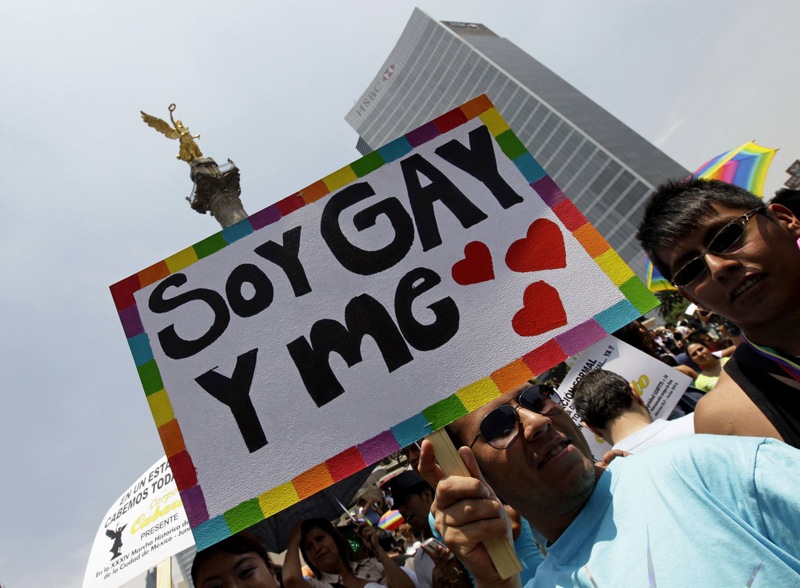




Comments
Great article! I think this is especially significant for Mexico, because homophobic language is EXTREMELY common here and there doesn’t seem to be much public awareness about the harmfulness of this kind of language, even from otherwise progressive and gay-friendly people.
For example, this song: http://www.youtube.com/watch?v=BD4P5TSX_Gw
It’s called Puto (fag), by one of Mexico’s most famous rock bands, Molotov. It’s played at parties and bars all the time, and whenever it comes on the entire room starts to jump up and down singing “Puto! Puto! Puto!” along with it. The first time I really listened to the lyrics, I asked my (totally lovely) roommate, “Wait a minute, what are they saying??” And she got this look on her face like she’d never really thought about it before and said, “Oh, I guess that is kind of bad… But they’re just calling this guy a puto cause they don’t like him, not cause he’s gay.”
It’s even popular at gay bars, which mystifies me; the lyrics are so horrific.
So I guess I’m hoping this decision provokes a lot of conversation and thought here–it’s really needed.
Wait, what does ‘matarile’ mean? I listened to the song and understood most of it, but I’m not quite sure about this word and couldn’t really find a translation anywhere?
but wow, that is really interesting that a song like that is popular in gay bars, of all places!
I’ve never actually heard anyone use the word, but “matarile al maricón” means “kill the faggot.”
Horrific, right?
matarile = slaughterhouse
so it means, “death to the faggot” but with de slaughterhouse twist :/
this is so fascinating and well-done. “the strong influence language has on people’s perception of reality,” is undeniable and yet often completely overlooked.
Love this article. Especially this part – “I’m American, which makes me incredibly skeptical of any limitations on freedom of speech. But it also makes me crush pretty hard on government entities (especially judicial branches, especially right now) that appear to prioritize speeding along social progress rather than riding its coattails and dragging their gavels. ”
I’ll admit I’m incredibly torn on this issue for similar reasons. I think most limitations on free speech create a dangerously slippery slope, but at the same time recognize and have experienced the intimidation and “enduring injuries to self-worth” that language can cause. Dyke. Fag. Queer. It beats you down. It intimidates you into silence, especially when the recipients of these slurs are young people. It’s almost impossible to avoid internalizing it – I know I did as a teenager.
I think where I’m landing on this is that it wasn’t a private citizen calling another private citizen a terrible word. Instead it was a newspaper – with all of the privileges of readership and power that come with that – calling someone a terrible word. I feel like it’s totally valid to expect a higher level of responsibility from institutions like the press, or the government, or a work place. In the end, we can’t legislate how people think (and I wouldn’t want to live in a country that did), but we can demand that institutions as a whole cannot create hostile environments that infringe on people’s well being.
(Feelings!)
Coming from another perspective (I’m French), I am astonished that some people could feel ambivalent about banning hate speech under the guise of freedom of speech.
Here in France, hate speech and discriminatory comments are illegal because they are deemed “incitation to hatred or violence” – recognizing the fact that language doesn’t merely reflect our society but shapes it.
Saying that hate speech should be allowed because bigots venting their hatred is a good opportunity to talk about discrimination is bogus – hate speech isn’t talking about discrimination, it’s actively propagating and enabling discrimination. If we want to talk about it, let’s give the people who actually experience it a voice and an opportunity to share their experiences.
The whole thing about allowing it because it makes victims “resolute and stronger” is a whole load of bullshit too, I’ve heard that exact same argument made by bullying apologists who think that protecting children from it is turning them into “softies”. Suicide rates amongst minorities’ teens and the countless recent studies on the effects bullying has on mental and even physical health tell a different story.
I agree. I hate the whole ‘banning some speech will lead to the end of all free speech!!!!’ argument because there are countries (like France) that have limitations on hate speech, and as far as I know, the French government hasn’t quite turned into Big Brother :P
Even here in the US, we have significant limitations on our free speech. Censorship laws limit our speech. Libel/slander laws limit our speech. Speech that incites violence isn’t protected. And that’s not even all of the limitations on our First Amendment rights! So really, I think that limiting free speech further by refusing to protect hate speech wouldn’t be so bad.
Anyway, my point is that my fellow USians who are commenting on how limiting free speech makes them uncomfortable might not need to be so squeamish over it; after all, we’re already doing it here.
As a Canadian, I have a really difficult time understanding the US obsession with freedom of speech at the expense of protecting people from vile hate speech. I find my morals aligning with France and Canada’s responses.
As a US citizen, I agree with Canada and France too! I don’t understand how that would necessarily lead to a slippery slope. It simply means that specific hate speech will not be protected nor tolerated which is a good move for expediting social progress; not all speech that speaks badly about a figure, organization etc
I think the issue Americans have with the idea of banning a certain kind of speech is that they are worried about who will decide what the label “hate speech” means, and how broadly it will be applied.
This is especially scary to religious people, who are worried that they will not be able to preach against certain behaviors without being in violation of hate speech laws.
I am not defending these people, but I do totally get where they are coming from. A few years ago there was an anti-bullying law up for a vote in the state of Kentucky that basically said that calling someone intolerant for their religious views was considered bullying, while expressing religious views that gay people were morally wrong was protected free speech. It got struck down, thank goodness, but that’s the kind of slippery slope people are afraid of with banning any free speech.
Nobody wants to hear from Westboro Baptist Church. If I were in charge I would have no problem enacting laws to keep them from protesting the way they do. But if they were in charge, they would say that my gay ways and my desire to squelch religious freedom was intolerant, and they would definitely call that hate speech and attempt to shut me up.
There are conservative religious people in Canada. They can express their intolerance of homosexuality without making it a campaign against our rights to live or love equally. Those that are actively hating our community are committing a crime. I don’t understand how Americans can’t adopt the same line of thinking, except, you know, the separation of Church and State doesn’t actually exist in the States…sigh
Having lived in both Canada and the US for significant amounts of time; I feel a bit torn, because I am opposed to hate speech, but defining what is hate speech is political. The debate in Toronto a few years ago over whether the term “Israeli Apartheid” was hate speech had more to do with preventing Queers Against Israeli Apartheid from participating in Pride events than it did with protecting marginalized groups from hate speech.
I think in the US, too many people think free speech protects them from having to face the consequences of their speech. Censorship exists everywhere, all the first amendment protects against is government censorship. I would prefer a culture in which people who use hateful language are accountable for what they say, but where the government does not have the ability to silence a person or group for vaguely defined hate speech.
I enjoyed this article and should have reply sooner because I think that a debate over this issue is long over due within the larger debate over human rights.
Let’s be clear. I’m as dead set against hate speech laws as I’m against bulling. There is a different between outright harassment and simple using offensive language to make a point. There is a difference between simple repeating the same slur as you follow a person around and using it in the context of a play, book, song etc. Should we call The Adventures of Huckleberry Finn hate speech because of it’s racial stereotypes and repeated use of the N word? There was a case in Arizona about in the late 1990s where a parent filed civil charges against a school for assigning the book to students! While the courts did rule that schools needed to recognize the often hurtful nature of words especially for children, they rejected the notion that a book alone could be held libel for CAUSING discrimination and violence.
You can find the court transcript in entirety here:
http://caselaw.findlaw.com/us-9th-circuit/1281281.html
(Sorry about the double post, but I needed to add correct a few things).
I believe hate speech laws stand to do more harm than good to the very people there supposed to help. For three reasons:
One, hate speech like obscenity is just too broad for anyone to could up with a universally embraced definition. As a result, there are many way that such laws could ban a lot of works of benefit to marginalized people. In some ways they already have. When the Canadian Supreme Court ruled in the 1992 Butler case that pornography should be considered a form of discrimination against woman, one of the first publications banned at the boarder was the lesbian erotica magazine Bad Attitudes. Many other publications made by and for women with a feminist of gay rights focus were also banned in the ensuing years. Usually it was either for depicting certain sex acts deemed considered degrading or for being anti-male!
Two, even in case where the work in question real is meant to promote prejudice; trying to punish the messenger may only empower them by making them look like martyrs. Those in power who tried to make oppressed people look like the advantage and themselves look like the victims would gladly try to banned the works of “deceivers” that they don’t like, all the while fighting to defend there right to spread dubious claims without bothering to answer for them. If there writing are banned they because more popular and when they are punished for publishing “controversial ideas” it help bring them pity.
Third, I don’t believe that any book or play can make a person commit discriminate violence that they would not have committed other ways. Nor more than any book, play, movie, song etc. can make a person gay. (A favorite argument for censorship pro-gay speech). Rather than decrease violence and discrimination, I believe should laws would make it easier for those who really committed such action to avoid full punishment by granting legitimacy to something like “the gay panic defense.” We already saw in The Jenny Jones murder trial how the civil suit by the victims family only added the arguments of the killer in appeals court, though thankfully it didn’t work (that time).
If we want to find writer accountable for direct uses terms of abuse and social or ethics slurs I’m all for it. However, I think Cara is on the money is saying hate speech should neither be considered a virus or opportunity. It’s a carrier for the disease, but it may hold opportunities for cures. The answer isn’t less speech, but more.
Me encanta este artículo! The progressiveness I’ve seen in Mexican politics makes me so happy.
I think that people underestimate exactly how important language is, and the way we use it. There’s a reason why ‘political correctness’ is imposed by law and public opinion; it reflects the progress made by our society. Those who use “maricon” and “fag” in ways to insult people who are not queer are incapable of:
a) Understanding the difference between clumsy irony and verbal prejudice and
b) Understanding the freedom TO abuse and the freedom FROM abuse, and
c) Understanding what true censorship is.
True censorship: me having to keep schtum while others use my sexual identity as a ‘funny’ insult.
See, I’m so annoyed I made a list. But yay Mexico.
This was an interesting article! It made me want to look up more information on Mexico’s court system.
I think this ruling is a step in the right direction.
This was a really interesting article, thank you!
I just have to share something mostly unrelated–but maricon (I don’t remember how to add accents on my computer?) and marica are related (I think one or the other is harsher depending on where you are). So when you roll the ‘r’ in my name, it’s pretty terrible.
One of my friends made a mistake of telling a really shitty girl about this when I was in high school, and I got called ‘hey lesbian!’ in the grocery store and people just nicknamed me ‘fag.’
Ironically I was nowhere near being out even to myself, but I’m still kind of mad about this.
Cultural context! I know like 7 Marikas and only two of them have unrolled R’s because they’re not Ukrainian. That’s a very shitty thing that happened to you :( I’ll be more aware of that around Spanish-speakers.
This is a really interesting article, thanks you. It also provided me a chance to review concepts like free and protected speech that I will need to know for my AP Gov test next month. Autostraddle: the gayest way to study for AP tests.
While I am glad that this story is being covered, I really wish that it had been covered by someone who doesn’t identify as
“American.” Because it’s really irritating to read that you had to go ask a white, linguistics expert to help you figure out what these words meant. It doesn’t feel like a fair way to give this great and interesting story coverage. Seeing as you could’ve, you know, asked just about any Spanish-speaking member of the AS community what this word meant.
Also. I’m surprised that no one mentioned that both North America and South America are America. So this statement, ““I’m American, which makes me incredibly skeptical of any limitations on freedom of speech,” makes very little sense to me. Using the word America when you mean the United States is quite careless, especially when you are covering news in a country that is also in America.
But in English, “American” generally means “person from the US”–it’s just how the English language works. We don’t have any other word for that. In Mexican Spanish, “norteamericano” means “person from the US”–despite the fact that Canada and Mexico are also in North America. That’s just the way Mexican Spanish works…
Now, using the word America to mean the United States, that’s a different issue.
Anei,
You’re totally right about my misusing “American” — it was an oversight, and one I definitely shouldn’t have made in a column about being careful with words. I’m sorry. I’ll pay a lot more attention to that in the future, and I’ve gone back and changed it so that it isn’t confusing. Thanks for pointing that out!
Also, I wrote this article because it was relevant and interesting to me as a queer person who likes language generally. It would be great to also have the perspective of someone who is [also] a Mexican person or a Spanish-speaking person. We’re always looking for pitches from writers, especially from groups that are underrepresented in the AS staff!
Cara,
Thanks I really appreciate your consideration of my comment. I love that AS is a place where people are interested in validating each other’s experiences. I am so glad this space exists.